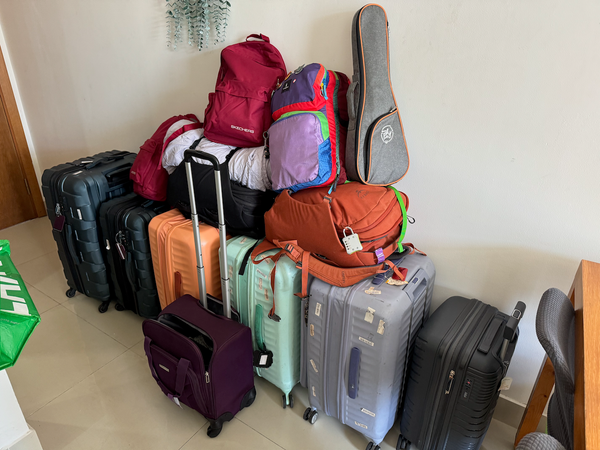Transoceanic Cruises: The Ultimate Guide to Ocean Crossings for Modern Travelers

After experiencing our first transatlantic crossing aboard the Queen Mary 2 in 2022, we've become passionate advocates for ocean crossing travel. As a travel advisor, I've discovered that while Cunard's ocean liners get most of the attention, nearly every major cruise line offers transoceanic crossings—though most are cleverly disguised repositioning cruises that provide incredible value for savvy travelers.
The Reality of Modern Ocean Crossings
Let's be honest about what most transoceanic cruises actually are: repositioning cruises. When cruise lines move their ships between seasonal deployment areas, they create opportunities for travelers to experience true ocean crossings at exceptional prices.
Spring Pacific Crossings: Ships relocate from Asia to North America (March-May) as they prepare for Alaska and West Coast summer seasons.
Autumn Pacific Crossings: The reverse journey happens in September-November as ships return to Asia for winter deployments.
Atlantic Repositioning: Ships move between the Mediterranean and Caribbean twice yearly, creating transatlantic crossing opportunities in April-May and October-November.
Other Ocean Routes: Ships relocate between Australia, South America, and other regions, offering unique crossing opportunities throughout the year.
While these aren't the leisurely ocean liner experiences of decades past, they provide modern travelers with affordable access to transoceanic travel that would otherwise be cost-prohibitive.
Why Choose an Ocean Crossing Over Flying
Ocean crossings offer benefits that flying simply can't match, especially for families and travelers who value the journey as much as the destination.
Gradual Time Zone Adjustment: Your body naturally adjusts to time changes during the crossing, eliminating jet lag recovery time.
Exceptional Value: Repositioning cruises often cost 40-60% less than regular cruise pricing while including the same amenities.
Unique Experience: Crossing vast oceans by ship creates memories no flight can provide.
Relaxation Focus: Multiple consecutive sea days force you to truly disconnect and unwind.
Luggage Freedom: Pack everything you need without airline weight restrictions or baggage fees.

The Best Times for Popular Ocean Crossings
Pacific Crossings
Westbound Pacific (Autumn): September through November offers the most frequent departures as ships return to Asia. This is prime season for comfortable weather and calm seas.
Eastbound Pacific (Spring): March through May provides excellent opportunities as ships move from Asia to North America, though weather can be more variable.
Popular Routes: Los Angeles to Tokyo, Vancouver to Seoul, or San Francisco to Singapore typically offer the best combination of dates and pricing.
Atlantic Crossings
Spring Crossings: April through June as ships move from Caribbean winter deployments to European summer routes.
Autumn Crossings: September through November offer spectacular weather as ships return to Caribbean positioning.
Traditional Routes: New York to Southampton remains popular, but consider Barcelona to Fort Lauderdale or Rome to Miami for unique experiences.
Other Ocean Routes
Australia to Southeast Asia: April through June provides optimal weather for these increasingly popular repositioning routes.
South America Connections: Ships moving between Europe and South America create opportunities for unique Atlantic crossings.
Cruise Lines Offering Ocean Crossings
Princess Cruises
Princess excels at transpacific repositioning cruises, particularly their autumn westbound routes from Los Angeles to Asia. Their ships provide modern amenities while maintaining the relaxed pace essential to ocean crossing culture.
Strengths: Excellent enrichment programs, comfortable ships designed for longer voyages, and sophisticated passenger demographics.
Holland America Line
HAL offers some of the best repositioning cruise experiences with their focus on destination immersion and cultural enrichment. Their longer itineraries and refined atmosphere appeal to travelers seeking authentic ocean crossing experiences.
Strengths: Superior service, extensive lecture programs, and ships built for ocean travel rather than calm-water cruising.
Celebrity Cruises
Celebrity's repositioning cruises provide modern luxury during ocean crossings, with their newer ships offering exceptional amenities for longer voyages.
Strengths: Contemporary design, excellent dining options, and entertainment that works well during multiple sea days.
Norwegian Cruise Line
NCL's repositioning routes offer more casual ocean crossing experiences, perfect for families or travelers preferring relaxed dress codes and flexible dining.
Strengths: Family-friendly atmosphere, diverse entertainment options, and freestyle cruising approach to ocean travel.
Royal Caribbean
Royal Caribbean's larger ships provide extensive onboard activities during ocean crossings, though the experience feels less traditional than smaller ship alternatives.
Strengths: Comprehensive onboard amenities, family programs, and modern facilities for longer voyages.
Cunard Line: The Traditional Option
While most ocean crossings are repositioning cruises, Cunard maintains regular transatlantic service aboard the Queen Mary 2. This represents authentic ocean liner travel with corresponding pricing and traditional atmosphere.
Our family's Queen Mary 2 experience provided genuine ocean liner elegance, though with limited kid-friendly options and premium pricing. You can read our complete family review in our Queen Mary 2 crossing article.
The Reality of Extended Itineraries
Most transoceanic cruises extend beyond simple point-to-point crossings. Cruise lines typically add 3-7 additional days with port stops at the beginning or end of repositioning routes.
Pacific Examples: A Los Angeles to Tokyo crossing might include stops in Hawaii, or a Singapore departure could feature Vietnam and Hong Kong before the transpacific portion.

Atlantic Examples: Barcelona to Fort Lauderdale might include Canary Islands stops, or Southampton to New York could feature Iceland and Greenland.

Cost Considerations: These extensions increase both cruise length and pricing, but often provide exceptional value for visiting destinations that would otherwise require separate trips.
Planning Benefits: Extended itineraries eliminate the need to book separate flights or accommodations for these additional destinations.
What to Expect During Your Ocean Crossing
Daily Life at Sea
Ocean crossings follow a completely different rhythm than port-intensive cruises. Expect 5-10 consecutive sea days, depending on your specific itinerary.
Morning Routines: Leisurely breakfast, deck walks, and settling into shipboard life Afternoon Activities: Pool time, lectures, workshops, or simply reading with endless ocean views Evening Entertainment: Formal or casual dining followed by shows, dancing, or stargazing

Entertainment and Enrichment
Quality ocean crossings emphasize relaxation and enrichment over high-energy entertainment:
- Guest lectures about destinations, history, and culture
- Language lessons for arrival countries
- Cooking demonstrations featuring regional cuisines
- Art auctions and cultural presentations
- Live music and dancing in multiple venues
- Library time and board game tournaments
- Fitness classes and spa treatments
Dining Experiences
Ocean crossing dining varies significantly by cruise line, from Cunard's formal traditional service to NCL's casual freestyle approach. Most lines maintain some dress codes for dinner during ocean crossings.
Pricing and Value Considerations
Cost Comparison
Repositioning cruises typically range from $600-2500 per person depending on cruise line, cabin category, and itinerary length. These represent exceptional value compared to:
- Business class flights for the same routes
- Separate hotel accommodations for 10-14 nights
- Individual flights to visit the extended itinerary destinations
Booking Strategy
Repositioning Cruise Availability: These cruises often have limited availability and sell out quickly once announced, typically 12-18 months in advance.
Interior Cabins: Perfect for ocean crossings since you'll spend most time in public areas enjoying ocean views.
Wave Season: January through March typically offers the best promotions for autumn repositioning cruises.
Last-Minute Deals: Occasionally available 60-90 days before sailing, but cabin selection becomes very limited.

Planning Your Ocean Crossing Adventure
Choosing Your Route
Consider your final destination, available vacation time, and interests in the extended itinerary ports. Pacific crossings work perfectly for Asian adventures, while Atlantic routes excel for European exploration.
Packing Essentials
- Clothing for variable ocean weather and different climates at departure/arrival ports
- Entertainment for multiple sea days (books, tablets, games)
- Formal attire if required by your chosen cruise line
- Motion sickness remedies (even large ships move in ocean swells)
- Camera equipment for endless ocean photography opportunities
Connectivity Considerations
Most eSIMs won't work during the ocean crossing portion of your journey, as ships rely on satellite internet with limited connectivity. However, you'll want data coverage for your destination ports. Check out Holafly eSIMs for your arrival destination and use our coupon code ADAMANDLINDS for savings on your data plan.
Family Considerations
Ocean crossings can work wonderfully for families willing to embrace slower-paced travel. Children often thrive with consistent routines and onboard activities, but parents should prepare for limited port excursions during the crossing portion.
Booking Your Ocean Crossing
Repositioning cruises require different booking strategies than regular cruises. These limited sailings often sell out within days of announcement, particularly for popular routes and desirable cabin categories.
Timeline: Most repositioning cruises are announced 12-18 months in advance with immediate booking availability.
Flexibility: Consider multiple departure dates and cabin categories to secure space on your preferred route.
Travel Insurance: Essential for repositioning cruises due to their unique nature and limited rebooking options. We recommend Faye Travel Insurance for comprehensive coverage designed specifically for unique travel experiences like ocean crossings.
Ready to plan your own ocean crossing adventure? As a travel advisor specializing in unique family travel experiences, I can help you navigate the complex world of repositioning cruises and find the perfect crossing for your family's travel style and budget.
Why Book With a Travel Advisor
PERSONALIZED TRAVEL RECOMMENDATIONS Customized travel planning tailored to your family's style and preferences
INSIDER KNOWLEDGE Expert advice from people who've actually been there and sailed these routes
VIP PERKS Free upgrades, spa credits, and exclusive amenities we've secured through our industry relationships
Contact me at [email protected] for personalized recommendations and booking assistance. I'll monitor repositioning cruise announcements and alert you when your ideal crossing becomes available.
Important Note: Repositioning cruises often have more limited availability than regular cruises and may sell out quickly. Consider booking immediately when your preferred sailing is announced, as cabin selection becomes very limited closer to departure dates.
Want to stay updated on the latest repositioning cruise announcements? Join our newsletter for early alerts about ocean crossing opportunities and exclusive travel planning tips.




